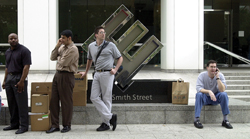Precedents
Dec. 2, 2001: Enron files for bankruptcy

Photo by AP Photo/David J. Phillip
First chartered in Omaha, Nebraska, as Northern Natural Gas, the company became Enron in 1985 when Kenneth Lay, a former federal regulator, began taking over. He moved Enron from Omaha to Houston, where Lay began accumulating debt and selling assets to help diversify the company's business dealings. Through the 1990s, the company became a financial juggernaut that capitalized on energy deregulation at the state and federal levels. By 2000, Enron—reporting annual earnings of $100 billion from the global distribution of natural gas, transmission of electricity, marketing of energy products, construction of power plants, commodities investments, broadband services, and even management of water and wastewater—was a perennial as one of Fortune magazine's "most innovative" companies, employing 20,600 people.
During the "dot-com bubble" of 1997 to 2000, Enron had endured and even thrived. But the experience caused some analysts to cast a skeptical eye on Enron's increasingly opaque financials and noticeably vague explanations for what was driving the company's success.
Under CEO Jeffrey Skilling and CFO Andrew Fastow, Enron had created a byzantine network of transactions between limited liability vehicles driven by unconventional accounting practices. The effect of these transactions was to overstate revenues and understate debt on the company balance sheet year after year. And when journalists and investment analysts began to question Enron's financial practices, Skilling and other Enron officials became evasive and angry.
By Dec. 2, 2001, when the company filed the largest corporate bankruptcy claim until that point in history, its stock—once valued at $90 per share—had bottomed out at 26 cents. The collapse left behind tales of self-dealing through "special purpose entities" with names like JEDI and Chewco, and trails of angry investors—among them, thousands of employees who had invested their life savings in Enron stock. Disclosures to the Securities and Exchange Commission later revealed that Lay and Skilling had been dumping large blocks of Enron shares, even as they were urging their employees to buy more to help the company stabilize.
In 2002, a Houston jury convicted the accounting firm of Arthur Andersen—Enron's accountants—of obstruction of justice. Though the Supreme Court later overturned the conviction, Andersen was forced to close its doors. In early 2004, Fastow pleaded guilty to wire and securities fraud and agreed to help prosecutors unwind the maze of Enron transactions. In 2006, Lay and Skilling were convicted of conspiracy and fraud. Lay died before he could be sentenced. Skilling is serving a 14-year sentence at FPC Montgomery. And the name Enron has become synonymous with unbridled corporate deceit.



